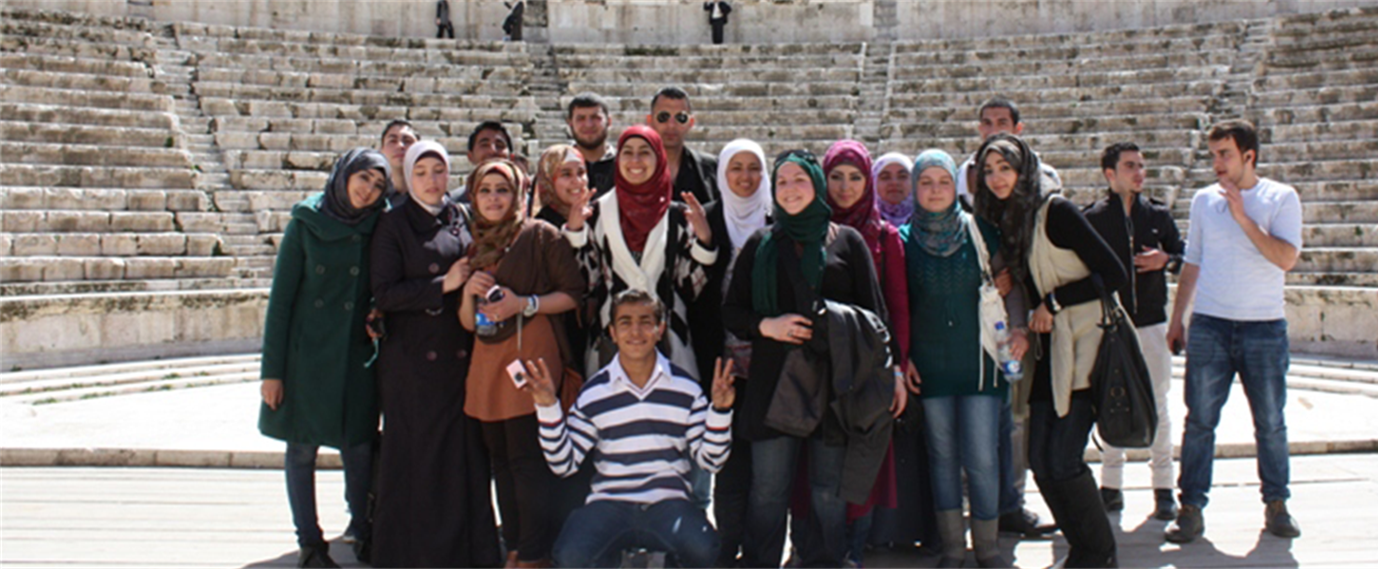كنتُ أحب ممارسة لعبة التقمص الوجداني مع طلابي، وهم بدورهم يتحمسون لذلك.. كنا نلعب كالتالي:
تخيّل أنك صحفي تعمل في صحيفة أو قناة فضائية أو موقع إلكتروني، وسمعتَ عن مظاهرات احتجاجية في مدينة الطفيلة جنوبي الأردن، هل يمكن أن ترسم خطة تشرح لنا كيف ستغطي هذا الحدث؟ وما الأسئلة التي تحضر في ذهنك وتجد من الضروري أن تحصل على إجابة بشأنها قبل أن تكتب أو تقدم تغطيتك؟
كان الطلاب يتناوبون على تقمص دور الصحفي، ولإكمال اللعبة كنا بحاجة إلى طرف آخر، مسؤول مثلا..
تخيّل أنك الناطق الرسمي باسم الحكومة، وكان أحد الأسئلة التي تلقيتها في مؤتمرك الصحفي مع وسائل الإعلام يقول: اعتقلت قوات الأمن ناشطين على خلفية المظاهرات الأخيرة في أكثر من مدينة أردنية، ما عدد المعتقلين؟ وما مبررات اعتقالهم؟ (هذه اللعبة على وجه التحديد خلقتْ لي مشاكل مع إدارة الجامعة).
كان الطلاب يتناوبون على تقمص دور الصحفي ودور المسؤول، وكنت ألاحظ دون عناء أنهم يتقمصون دور المسؤول ببراعة وذكاء، وكلما ارتفع مستوى المنصب، ارتفعت قدرتهم على تقمص دوره، والدفاع عن قراراته، في حين كانوا يتعثرون في تقمص دور الصحفي، وطرحُ السؤال هو الأصعب! بدت أدوات طلابي فقيرة على صعيد طرح السؤال.. وكثيرا ما كنتُ أتجه إلى اللوح، وأرسم لهم علامة استفهام كبيرة، لأذكرهم: الصحفي هو هذا! أن تكون قادرا على الشك وطرح سؤال يحتاج إلى إجابة، وأن تسعى للحصول على تلك الإجابة، لكنك بدون براعة طرح السؤال ستبقى حائرا على أبواب هذه المهنة دون أن تعبر من بابها الأول.
ولا يمكن لوم الطلاب على هذا القصور، فالإنسان الذي يقابله المدرس في غرفة التدريس نتاج بيئة اجتماعية وثقافية تتضافر مع الخبرات والتجارب ومناهج التدريس في مجموع نسميه في الإعلام "الإطار المرجعي". ولم يكن الإطار المرجعي وحده من نلقي باللوم عليه، كانت قاعة التدريس والمناهج والخطط المقترحة لتدريس الطالب أيضا؛ فقيرة بصورة لا يمكن معها وضع الطالب في صورة الأمواج الجديدة في مجال الصحافة والإعلام.
في أحد الفصول تقرر أن أدرّس مساق "كتابة التقرير الصحفي"، وتفاجأت أن زملاء لي يقترحون على الطلاب كتبا ومناهج تعود إلى ثمانينيات وسبعينيات القرن العشرين، ويكتفون بتلقين الطلاب مواصفات التقرير وكيف يُكتب وفق الهرم المقلوب أو المعتدل، وهذا برأيي لا يمكنه أن يعلم الطلاب "كتابة التقرير الصحفي"! وكثيرا ما دخلت مع زملائي في جدال حول جدوى ذلك، وكانت الحجة التي تساق: أنتِ جئت من خلفية صحفية، عملتِ في الصحافة قبل أن تدخلي المجال الأكاديمي، ولذلك تولين أهمية للتطبيق على حساب النظرية.
ولم يكن ذلك دقيقا، إذ إن دفاعي عن ضرورة زج الطلاب في الميدان وتعليمهم الصحافة في "الشارع"، لايعني بأي وجه من الوجوه التقليل من التقاليد الأكاديمية والأطر النظرية لهذه المهنة، بل على العكس، لكنني أرى أنها خطوط عريضة تعين الطالب على التحرك في الميدان.. الميدان الذي لا يكاد الطالب في كليات الإعلام العربية يعرفه إلا في مشروع التخرج في سنته الأخيرة. وهذه الخطوط العريضة تحتاج إلى التحديث بحيث تجعل الطالب مدركا لحالة التغيير المتسارع الذي يشهده هذا المجال اليوم، وقادرا على المنافسة في رحلة البحث عن عمل.
المفارقة أنني عندما درَستُ تخصص الصحافة والإعلام في جامعة اليرموك (1990 ـ 1994)، وكانت الجامعة الوحيدة التي لديها هذا التخصص، وفّر القسم صحيفة كنا ننتجها نحن طلاب "التحرير الصحفي" من الألف إلى الياء. وشكلت "صحافة اليرموك" -وكانت ورقية آنذاك- صحيفة مجتمع محلي بكل ما تحمله الكلمة من معنى، تصدر مرة في الأسبوع وتناقش قضايا واقعية، وتتضمن تغطيات ميدانية. وانطبق ذلك أيضا على تخصصيْ الإذاعة والتلفزيون، حيث توفرت للطلبة أستديوهات إذاعية وتلفزيونية يديرها الطلبة ويبثون من خلالها داخل الحرم الجامعي، تقارير وبرامج مصدرها أكثر من مدينة أردنية.
استند أسلوب التدريس في تلك الفترة على خلق ألفة بين الطالب والعمل الميداني، وعندما عدت إلى هذا المجال أستاذة، ورغم انتشار الكليات والأقسام التي تدرس هذا التخصص، أدركتُ أن الأدوات والمحتوى الذي يقدم للطلاب في عدد كبير من الجامعات لا يمكن معه تخريج صحفي كفء قادر على القيام بأعباء المهنة، فبعض الجامعات كانت تجهز أستديوهات للحصول على موافقة وزارة التعليم العالي، ثم تغلقه في وجه الطلبة وكأنها تخاف أن يتلفها الطلاب.
وعودة إلى حكاية مساق "كتابة التقرير الصحفي"، لم يكن تعليم الطلاب الأسس النظرية لكتابة التقرير بحاجة إلى عناء ووقت طويل، لكن المشكلة كانت في "خلق الأفكار" التي تصلح أن تكون تقريرا، وبناء محاججة مقنعة بشأنها من خلال معرفة آراء الفاعلين في القضية، ولم يكن ذلك ممكنا وسط حيطان أربع. كانت جدران القاعة ثقيلة بالنسبة لي كمدرسة، وثقيلة في الوقت ذاته بالنسبة للطلاب، خاصة أولئك القادرين على طرح التساؤلات والتفكير بما يتعدى أسوار الجامعة. ولم يكن ينفع اللجوء إلى الخيال، في وقت يمكن للطلاب أن يعيشوا تجربة واقعية، ويدربون حواسهم على الإصغاء والنظر والالتقاط، بل وتنمية الحس النقدي والنفاذ إلى ما هو أبعد من الظاهر.
كان لا بد أن أقلب الهرم التقليدي في التدريس الجامعي، وأن أشرع في جعل الطلاب أكثر قربا من مناطق الحراك الإنساني، فقررت أن أدعو طلابي إلى جولة سيرا على الأقدام في وسط مدينة عمان، واتفقنا أن أدعوهم إلى وجبة الإفطار في مطعم هاشم -وهو مطعم شعبي قديم ومعروف- بشرط أن يكون مع كل منهم ثلاث أفكار تصلح كتقارير وقصص صحفية عندما نعود مجددا إلى قاعة الدرس.
لم يتغيب عن الجولة إلا عدد قليل منهم، وجاء البقية في الموعد المقترح للتحرك.. لم يكن ذلك اليوم مجرد رحلة على الأقدام بقدر ما كان تفاعلا مختلفا بين الأستاذ وطلابه في بيئة مفتوحة وغنية، فما كادت الجولة تبدأ حتى كان طلبتي يديرون حوارا مع الباعة والناس في شوارع المدينة القديمة وأزقتها، ويطرحون أسئلة بشأن سكة الحديد والمدرج الروماني والجامع الحسيني، ويستمعون إلى حكايات ما زالت مقاهي عمان شاهدة عليها، ومنها مقهى حمدان الذي شكل في فترة مبكرة من عمر المملكة نقطة تجمع لشخصيات وطنية، وشهد أول مؤتمر وطني أردني عام، ضم سياسيين وممثلين للأحزاب الوطنية عام 1928. كان مقهى حمدان واحدا من مقاهٍ عدة مثلت صالونات سياسية في فترة ما من تاريخ العاصمة. واندفع بعضهم نحو كشك شهير لبيع الكتب هو كشك أبو علي، معروف عنه أنه يبيع الكتب بالتقسيط، ولديه زبائن دائمون من الوزراء والشخصيات السياسية على مختلف ألوانها.
عندما عدنا إلى قاعة الدرس في المحاضرة التالية، وجدت طلابي يلقون الفكرة تلو الأخرى.. لقد بدوا أكثر قدرة على التعبير عن أنفسهم وأفكارهم، ثم صاروا يأتون بقصص واقعية من مجتمعهم.. مع نهاية الفصل، لاحظت أن كثيرا منهم قد نسج علاقة قوية مع "السؤال"، لقد عقدوا صداقة معه.








































